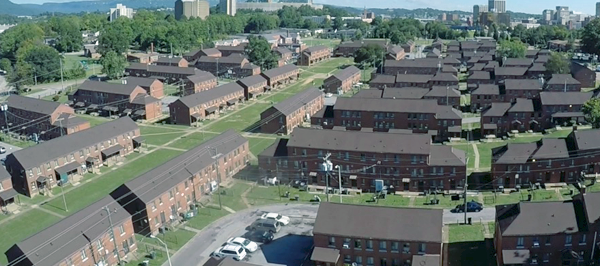
Most of what I’ve learned in inner-city ministry among the materially poor over 30 years can be summarized as: Be Good News, Be uncomfortable, Be consistent.
Our field
Jesus came to earth “to proclaim good news to the poor…liberty to the captives and recovering of sight to the blind, to set at liberty those who are oppressed.” (Luke 4:18 ESV). In my experience in Chattanooga, TN, subsidized housing authority apartments contain more problems than almost any other area for size, other than hospitals and homeless encampments.
Please bear with some Westside demographics. We work primarily in two low-rent apartment complexes—College Hill Courts (497 units completed in 1940—a Public Housing Authority property), and “Golden Gateway” (160 units), located on Grove St. According to statisticalatlas.com, Black household income averages $10,900 in this zip code--37402, which includes other ethnicities and areas than Grove St. In 2019 it was the sixth poorest zip code in America. Public housing rents start at $50 per month. Roughly a third of College Hill residents move each year, so building supportive or redemptive relationships is challenging. Fortunately, downtown is within walking distance, providing easy access to retail and some factory jobs. Other obvious generalizations are that Blacks comprise perhaps 95% of residents, and that College Hill probably has over 90% female-head-of-households. This year I met a joyful Black couple married for 25 years, who had moved in 6 months earlier. They had not met another married couple during that time. Fathers may or may not help their “baby momma”--one friend has at least five (and complains of child support).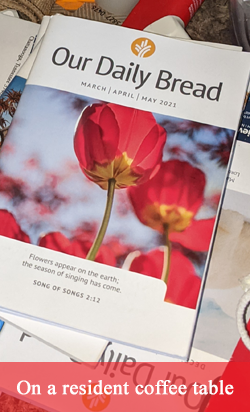 It is essentially a fatherless community. There are fewer and fewer Christian elders to whom guys will listen. In fact, down to early teens, the younger the guy on the street, the more he is feared as being potentially out of control. A consistent, caring father figure is appreciated. Whether or not some of us are that, on rare occasions we experience hostility from race-based cults, such as Black Hebrew Israelites, and from a few claiming to be Muslim. So far local friends have quickly shut down any serious opposition.
It is essentially a fatherless community. There are fewer and fewer Christian elders to whom guys will listen. In fact, down to early teens, the younger the guy on the street, the more he is feared as being potentially out of control. A consistent, caring father figure is appreciated. Whether or not some of us are that, on rare occasions we experience hostility from race-based cults, such as Black Hebrew Israelites, and from a few claiming to be Muslim. So far local friends have quickly shut down any serious opposition.
Most are willing to talk about God and heaven. Not a few cling to God as their best hope. If we pray with someone on their front porch, often others walk up and join hands. Most want positivity and happily receive a Daily Bread or a New Testament ([NT] which includes a gospel presentation), or a tract. We try to saturate the area with scriptures, also offering complete Bibles, children’s Bibles and large print Bibles. A guy jokingly admonished us for trying for the eighth time to give him a NT. Many believe they must merit heaven, not understanding that salvation is by faith in Christ (John 3:16; Acts 16:30-31; Eph. 2:8-9; Titus 3:5). We try to engage those receiving materials, rather than just handing them out.
Probably the majority of residents does not attend church—particularly from teens to 40s. Some have had sour experiences. Others consider themselves “spiritual,” or are into pagan religion (e.g., Egyptian Kemetic spirituality), or cults (e.g., Black Hebrew Israelites). We sometimes bring folks with us to church or refer them to vetted churches providing transportation.
It’s not unusual to smell marijuana, nor surprising for a friend to admit to selling drugs. Recently a resident experienced the death of her sister, and two days later her son died from ingesting fentanyl. Not long ago a woman died of a drug overdose two days after moving in, leaving her pre-school daughter. Women and 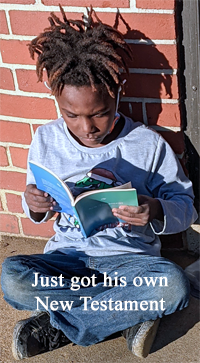 children are vulnerable to exploitation and violence. Levels of gang violence, evidenced by revenge shootings and sometimes fights, ebb and flow with the jailing of leaders which leaves a contest for power.
children are vulnerable to exploitation and violence. Levels of gang violence, evidenced by revenge shootings and sometimes fights, ebb and flow with the jailing of leaders which leaves a contest for power.
The community safety net includes rent subsidies, at least in part through Housing and Urban Development, the Supplemental Nutrition Assistance program (SNAP), and Social Security Income. An informal safety net consists of sharing food and other necessities with nearby neighbors. Some help to the point of depletion, exhaustion, and tears. Some look out for older people. A local church-based ministry distributes sandwich bags each week. Some ask for five or six bags. Our ministry provides $25 grocery store gift cards. The closest affordable large grocery store is 3 miles away. Sales of beer, smoking products, and lottery tickets are brisk at the local (Muslim-run) convenience store, draining income. Neighborhood collections are common to cover funeral costs, and friends gather to stay with the bereaved. Usually, an impromptu memorial is created at the site of a shooting.
How can such a community be accessed? Neighbors are often suspicious of neighbors, and particularly of outsiders. Gate keepers found and vetted us. Fletcher, a community elder and also a younger gang member, both professing Christians, examined us. We described “our” Gospel and reasons for being there and were accepted. Years later the elder, who became a close friend, told us that if they had disapproved, we could not have stayed. Because we have been at the Westside for so long, we are now gatekeepers. Those with us are accepted, but if one of our workers is eventually rejected, they cannot be on the team.
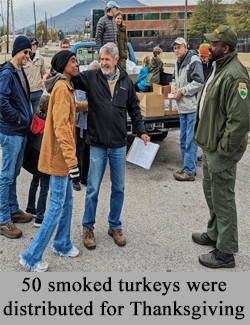 Goals
Goals
We go in teams of two or three. Teams are usually biracial, demonstrating God’s reconciling power. One team is an African America couple married for 40 years--a message in itself. We offer on-the-job training to those interested in joining us. Online training and ministry resources are available at https://rmni.org/files/handouts/ and at https://www.rmni.org/urban-ministries/inner-city-evangelism.html. We encourage team members to disciple those who are faithful, able, and teachable.
We share the good news of Christ, but also try to be good news, offering friendship, prayer support, books for specific needs, and material help. We distribute a list of community resources, including job sites. Food gift cards, smoked turkeys, tools, emergency rent and utility assistance, clothes, furniture, and contributions for funerals, etc. may be offered, as available. Those “born from above” usually experience economic lift. New Christians begin to prosper as they follow the biblical work ethic and stop wasting money. In summary, we try to build long-term discipling relationships, leading disciples to solid churches.
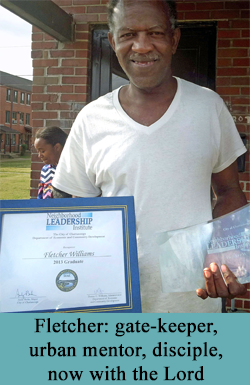 Strategy
Strategy
We are street-based. We have no onsite office, so we’re affected by heat, cold, and rain. We don’t go door-to-door but pray for “divine appointments.” We desire to be led by the Spirit, particularly to those the Father is drawing toward Christ (John 6:44). We visit friends, and follow-up on needs. We converse with people on sidewalks, porches, and in cars. Since 2002 we have come on Thursday afternoons, except on rare occasions, or during year-end holidays. We can’t see everyone each week, so people remark when we don’t come. Ministry often comes down to presence--showing up.
This strategy would fail were it not for intercessors. Each week a Wednesday email describes the previous week’s work, with requests for the following day. Several ladies are prayer warriors and amazing encouragers, one of whom, now 90, walked with us as long as health permitted. This strategy, or elements of it, can easily be adopted by churches, especially by partnering Black and White churches. It does not require a fulltime leader or a building. Guidance for handling requests for material help is located at https://www.rmni.org/financial-ministry.html.
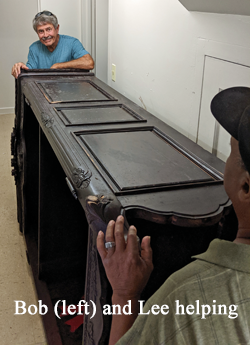 Why do this work?
Why do this work?
Each week we prepare for spiritual warfare. Who will be on the team this week, and who will we meet? Almost every week I return home thankful--it’s often the week’s highlight. I see enough progress to return. Another incentive is working with dedicated, unafraid, compassionate Christians. And the more we share the Great News, the better we understand its fullness (Philemon 1:6).
We recently met a woman and stepdaughter looking for a church, and transportation. I texted a pastor, and they went to church the next Sunday. We followed up with the woman who lost her sister and son within a week. We provided a Bible and the booklet, “Dear Muslim Friend” to Sudanese immigrants--one Christian, one Muslim--sitting in their car, as they did the previous week. I had a Bible study with a guy who returned to Chattanooga after serving time. We provided gift food cards to a woman making a meal of potatoes, onions, and cake to share with her mentally handicapped neighbor. We provided a NT to a teenager who was sitting on his bike. He attends church, but apparently didn’t have a NT. We arranged for a man with no insurance, to see a specialist in our church.
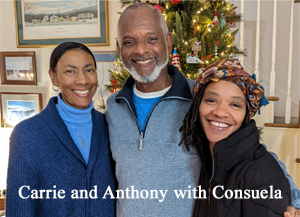 Results?
Results?
Progress is measured in years and isn’t linear. One moved to another state to take up fathering of his two daughters, crediting our influence. One friend told me that we were a “reality check,” helping them see the need to get and keep a job. A few have been born from above, by God’s grace. One young woman was contemplating suicide when a worker visited several women in an apartment. An impromptu Bible study developed and in the course of the study the woman was apparently saved. She read the four Gospels, Acts and Revelation within a week. Several older Christian ladies discipled her, as well as three pastors. She was baptized and joined a strong church. She now has a steady job and studies books on spiritual warfare. Another woman became a strong church member and is our resident ministry partner, coaching us regarding needs, and helping to distribute resources.
Recruiting workers is difficult. Fear and lack of interest in our methods are the greatest barriers. Christians seem to prefer to work from a church or ministry building, where they have authority, a sense of protection, and obvious resources. I consented to teach a seminar on inner-city evangelism to an inner-city church over four evenings, with the understanding they would practice at the Westside, a few miles away, what they learned. No ongoing commitment was requested. None came, including the Black pastor. They showed no interest in even going nearby where men hung out around a 55-gallon drum. In my experience, Black and White churches may provide funds, but they do not often mobilize to send workers. Is it unwillingness to identify downward, economically?
Christians are to go into all the world, where two-thirds of people do not claim to follow Christ, not to stay in fortress-church. In my experience, the great majority of churches won’t physically go among the neediest and most alienated, where Christians may be uncomfortable. The church, the ecclesia, comprises “called out ones,” not called in ones. We go out, to bring the unsaved in—in turn to be trained to go out. No going, few unsaved coming. The Barna Group found in 2019 that 47% of their sample of Millennials felt that it is “at least somewhat wrong” to try to get someone of another religion to become a Christian—followed by 27% of GenX, and 19% of Boomers-- https://www.barna.com/research/millennials-oppose-evangelism/. The American church continues its long decline in attendance and influence, blithely following the now-skeletal church of the UK and Western Europe. Francis Schaeffer identified the idols of personal peace and prosperity. Areas of the materially very poor will become yet darker, more fatherless, and probably more violent. Many will not hear good news, without testimony to, and demonstration of the love of God in Christ.


























